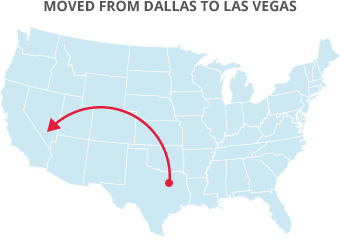
You have a business to run. And now you’ve got to run it while you’re moving it from one location to another! How do you keep your San Antonio business growing and the profits flowing while your furniture’s going out the door? That’s the “million dollar” question of office relocation! Give it a wrong answer, and your productivity and profits will go out the door with the furniture.
At A-1 Freeman Moving Group, we’ve got a correct answer for you – one that’s predicated on helping keep you from making 8 errors that we, as
office relocation specialists, find all too commonly made:
- Not Planning Ahead. When you first get word that you’ve got to move, that’s when you ought to begin planning for it. Regrettably, too many businesses begin their office relocation planning a little too late. Too late for what, you ask? Well, too late for moving companies and other providers to come up with a decent proposal for you, let alone properly deliver the goods and services you purchase from them. Keep in mind: too little time frequently leads to too many blunders. Let the size of your firm and the complexity of your move – i.e., the number of steps that must be finished before other steps can be begun – guide you in deciding how soon is soon enough.
- Not Checking Out Your Mover Thoroughly. Office relocations are complex. You need a moving company that’s experienced enough to deal with office furniture and modular systems, computer systems and networking, office equipment, machinery, and hardware, cabling, phone systems, security systems, building permits, and ... that’s just contemplating, make sure they’re legitimate. Check https://ai.fmcsa.dot.gove/hhg/search.asp to see, first of all, that they’re U.S. Department of Transportation (DOT) licensed and insured, especially for interstate commerce. Examine the reviews at bbb.org. to see if any grievances have been filed against them with the Better Business Bureau. And, if you can, talk with other firms who’ve hired them to learn how well they lived up to their contractual obligations. It’s also wise to ask about their moving crews – whether they’re full-time employees or temps, whether they’ve been background checked and drug tested, and whether they adhere to standard chain-of-custody procedures.
- Not Coordinating and Communicating Properly with Your Mover. Your office relocation manager is obligated to work with the project manager your moving company has allocated to see that your internal team and the moving company’s team are tracking together. Any [[changes in the schedule need to be properly conveyed to all involved, so that one delay doesn’t give rise to all sorts of errors and cost overruns.
 Not Assigning Enough Internal Staff to Your Move. The complexity of any office relocation practically dictates that you get the help of your own personnel. Go for people in each department who apprehend their department’s needs fully and have access to relevant company records. That may not always be the department head! To be truthful, you’re often better off requesting the help of veteran but non-managerial staffers, as they’re more likely to submit to your relocation manager’s dictates without argument.
Not Assigning Enough Internal Staff to Your Move. The complexity of any office relocation practically dictates that you get the help of your own personnel. Go for people in each department who apprehend their department’s needs fully and have access to relevant company records. That may not always be the department head! To be truthful, you’re often better off requesting the help of veteran but non-managerial staffers, as they’re more likely to submit to your relocation manager’s dictates without argument.- Not Following the Schedule. It’s seldom the case that an office relocation schedule slackens. Sure, various steps can be held up for this or that reason. But what typically happens then is that the schedule gets tightened. And that typically happens because the planning got started too late. And what happens when you attempt to compensate for lost time? More people from your end and the mover’s end are forced to work more overtime hours. Everybody starts annoying everybody else. Things get confused. Mistakes are made. And who pays for all this? Yep. Better to establish a practical schedule up front and follow it.
- Not Budgeting Sufficiently for Your Move. Frankly, it’s not easy for any company that hasn’t been involved in a relocation before to know just what its move will end up costing. To leave that cost to chance, though, or to budget for it inadequately is a big no-no! Typically, you need to figure in recurring real-estate costs, soft-dollar expenses for, say, employee relocation and training, capital expenses such as new furniture and office equipment purchases, moving expenses, and consulting expenses for such things perhaps as interior design and engineering. The more of your likely expenditures you explore at the start, the more manageable the expense of your office relocation will be.
- Not Having Enough Coverage. If you’ve decided to sign with a professional relocation company of any repute, the potential for property damage is small. That said, you be prepared. Talk with your mover about the coverage options they provide and select the most appropriate for your firm.
- Not Taking Care to Back Up Your Data. We needn’t call up horror stories here. Suffice it to say that when your office relocation is underway, your company’s material records are best protected by being backed up digitally, whenever doable. Those that can’t be digitized ought to be stowed securely in a warehouse. And your digital data ought to be backed up in the cloud. Historically, losing such data or suffering its damage isn’t a frequent experience. But do you really want to risk it? Then, however you can, back it up!
A great way to avoid these sorts of blunders – or to compensate for them effectively – is to engage the services of a moving company that has a proven track record of successful office relocations. May we call your attention to A-1 Freeman Moving Group right here in San Antonio? Check us out as we suggest above. Then look over our
office relocation services and ...
Request a free quote



 You have a business to run. And now you’ve got to run it while you’re moving it from one location to another! How do you keep your San Antonio business growing and the profits flowing while your furniture’s going out the door? That’s the “million dollar” question of office relocation! Give it a wrong answer, and your productivity and profits will go out the door with the furniture.
You have a business to run. And now you’ve got to run it while you’re moving it from one location to another! How do you keep your San Antonio business growing and the profits flowing while your furniture’s going out the door? That’s the “million dollar” question of office relocation! Give it a wrong answer, and your productivity and profits will go out the door with the furniture. Not Assigning Enough Internal Staff to Your Move. The complexity of any office relocation practically dictates that you get the help of your own personnel. Go for people in each department who apprehend their department’s needs fully and have access to relevant company records. That may not always be the department head! To be truthful, you’re often better off requesting the help of veteran but non-managerial staffers, as they’re more likely to submit to your relocation manager’s dictates without argument.
Not Assigning Enough Internal Staff to Your Move. The complexity of any office relocation practically dictates that you get the help of your own personnel. Go for people in each department who apprehend their department’s needs fully and have access to relevant company records. That may not always be the department head! To be truthful, you’re often better off requesting the help of veteran but non-managerial staffers, as they’re more likely to submit to your relocation manager’s dictates without argument.